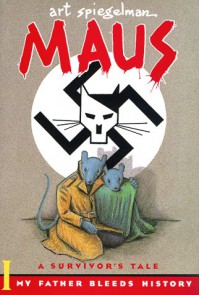 I can't think of any life experience from the Holocaust lacking a compelling narrative. Though I find the term trite, how could any biography of one facing such systematic "evil" be anything but engrossing?
I can't think of any life experience from the Holocaust lacking a compelling narrative. Though I find the term trite, how could any biography of one facing such systematic "evil" be anything but engrossing?In light of the context, it's difficult for me to address Mauson its merits as a graphic novel or a biography. The story of Art Speigelman's father as a Polish Jew in Nazi-occupied Poland touches on a level of fear and suffering to which I can't honestly relate. Which, I suppose, is the real success Maus achieves. To convey this tragedy by comic.
As any quick Wikipedia search will tell you, the Jewish Poles are portrayed as mice and the Germans as cats. A play on the treatment of Jews as vermin by the Nazis. And the other obvious qualities that go along with anthropomorphizing cats and mice in this context need little elaboration. However, what does not seem so obvious to me is how this further distances the reader from the story.
Spiegelman gives the impression that he is reciting the story from his father with raw honesty. He includes in the story a scene during which his father tells Spiegelman of his girlfriend before meeting Speigelman's mother. The father makes him promise not to include it in the book. But he does. These intimate details are scattered throughout the story. We are reminded how real this story is. Yet I still felt distant. The treatment of people as animals further heightens the sensation that despite compassion, one cannot relate to certain horrors and trauma. Empathetic imaginations are no substitute for experience.
To achieve this within word balloons and panels seems quite impressive to me.
And I have no idea if it's intentional or what it may mean, but the hands and head of grandfather ghost on page 57 looks like a human underneath the head tefillin.




